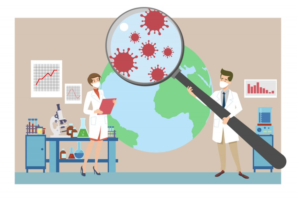It is important to us that we have good health as we go through life. Thanks for coming to “Disease Prevention Insights: Key Strategies Unveiled.” In this detailed guide, we will go over the most important strategies that will allow us to take charge of our health. Let us start a journey to understand and use key insights for successful disease prevention, from easy lifestyle changes to practices that have been shown to work. Click here.
How Disease Prevention Works: A Look at the Field
A Complete Approach to Health and Happiness
Taking a whole-person attitude to health is part of disease prevention, which is more than avoiding getting sick. Understanding how genetics, living choices, and the environment are linked can help us develop ways to reduce greatly e the chance of many diseases.
The foundation of preventing disease is good nutrition.
Getting the Right Food
The food we eat is one of the most important ways to stay healthy. Choose foods high in healthy fats, lean meats, whole grains, fruits, and veggies. These foods are full of good nutrients for you and your immune system. They also help keep your important organs healthy.
Hydration: Always Important, Often Forgotten
In terms of keeping yourself healthy, staying hydrated is an easy but often overlooked tip. For healthy systems and better nutrition, water is essential. Make drinking water a conscious part of your daily life.

Physical activity is a key part of staying healthy.
Cardiovascular exercise makes the heart stronger.
Regular aerobic exercise is a powerful way to keep diseases at bay. Walking quickly, riding a bike, and swimming are all exercises that are good for your heart and improve circulation, which lowers your risk of heart disease.
Building a Strong Defense Through Strength Training
Adding strength training to your routine will not only help you build muscle and become more flexible, but it will also make your bones stronger. This double effect lowers the chance of osteoporosis and strengthens the body.
Managing stress: Taking care of your mental health
Meditation for mindfulness: calming the storm
In our busy lives, dealing with stress is an important part of staying healthy. Mindfulness meditation is a strong way to clear your thoughts, lower stress, and improve your emotional health. Every day for just a few minutes can make a big difference.
Yoga: Mind and Body in Balance
Yoga is a complete way to deal with stress because it includes controlled breathing, physical poses, and meditation. In addition to making you fitter, regular yoga practice improves your mental clarity, emotional balance, and ability to bounce back from life’s obstacles.
Good sleep is the unsung hero of disease prevention.
Getting into good sleep habits
Getting enough good sleep is one of the most important things you can do to stay healthy. Setting up a regular sleep schedule and making your bedroom a good place to sleep can help your happiness, brain function, and immune system.
What Sleep Does for Long-Term Illnesses
Chronic diseases like diabetes and heart disease are more likely to happen if you do not get enough sleep. Sleep should be a top priority as a basic way to stay healthy.
Early detection saves lives, so get regular check-ups.
Regular check-ups: A way to avoid problems
Regular check-ups are important for avoiding diseases before they get worse, not just identifying conditions that are already there. Screening tests, vaccines, and regular physical exams make finding problems early and taking action possible.
Knowing Your Numbers: Making Prevention Easier
People can take steps to avoid getting diseases if they know about important health measures like blood pressure, cholesterol numbers, and body mass index (BMI). You need to know your basic numbers to make smart decisions about your health.
Lifestyle changes: little changes that have a big effect
Giving up tobacco: a clear way to stop it
One of the most important changes you can make to your lifestyle to avoid getting sick is giving up tobacco. Giving up smoking or eating tobacco has benefits that last for a long time and happen right away. For example, it lowers the risk of cancer and improves the health of your lungs.
Finding the Balance in Moderate Alcohol Use
Some studies show that drinking alcohol in moderation might be good for your health, but drinking too much is bad for you. Understanding and controlling how much booze you drink is key to staying healthy.
Thoughts on the Environment: More Than Just Personal Choices
Air Quality and Health of the Lungs
The place where we live affects our ability to stay healthy. Please pay attention to the air quality because it can worsen lung illnesses. Take steps to improve the air quality inside your home, and be aware of pollution outside.
Sun protection: Keeping skin cancer at bay
Simple things that people do, like using sunscreen and staying out of the sun too much, can help prevent skin cancer. Protecting yourself from the sun daily will lower your chance of getting dangerous UV radiation.
Genetics and Customized Health Care
Genetic Testing: Making Smart Choices
As DNA testing improves, it tells people a lot about how likely they are to get certain diseases. With this knowledge, people can make personalized plans for staying healthy, which gives them the power to make smart choices about their health.
Family history: a plan for staying safe
Learning about your family’s medical background is a smart way to stay healthy. It helps doctors find possible DNA risk factors and make sure that the steps they take to protect you are right for you.

Conclusion: A Blueprint for a Healthier Tomorrow
To sum up, preventing sickness is not a one-size-fits-all task. A person’s journey is unique and changes over time. It includes living choices, proactive healthcare, and being aware of the surroundings. We can protect ourselves from many health risks by implementing these key tactics daily. Get these tips on how to avoid getting diseases, and you will be on your way to a better, stronger future.
FAQ:
In our piece “Disease Prevention Insights: Key Strategies Unveiled,” we take you on a learning trip as we reveal important ways to keep diseases at bay. Find the secrets behind proactive health measures and give yourself the tools to protect your health. Let us work together to make the future better.
Goals and Basic Ideas of Disease Prevention:
Disease prevention aims to lower the number of illnesses that happen, make them less severe, and lessen their effects. These are the general rules:
Primary prevention tries to stop diseases from happening in the first place. Changes in living, vaccinations, and health instruction are common ways to do this.
Secondary prevention tries to find and treat diseases when they are still in their early stages so they do not worsen or cause more problems. Some examples are regular checkups and medical help at an early stage.
Tertiary prevention focuses on lessening the effects of already present diseases, stopping new problems, and raising the quality of life through management and recovery plans.
Idea Behind Disease Prevention:
The idea behind disease prevention is to take cautious steps to stop sicknesses from starting, getting worse, or happening again. It includes many actions, from encouraging healthy habits and settings to finding problems, treating them quickly, and helping people improve.
Lifestyle choices are a way to avoid getting sick. Eating well, working out regularly, getting enough sleep, and learning how to deal with stress can all help keep you from getting sick.
As a group, we need to stay immune to dangerous diseases; vaccinations are a key way.
Health education: People can make better decisions when they know about risk factors, healthy habits, and how important tests are.
Access to Healthcare: Getting medical care and preventative services when needed is key to staying healthy and avoiding getting sick. Read more.

